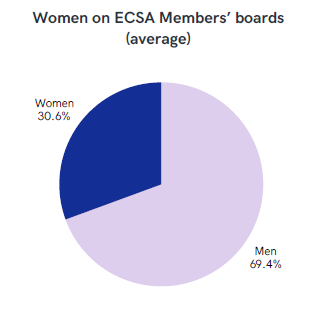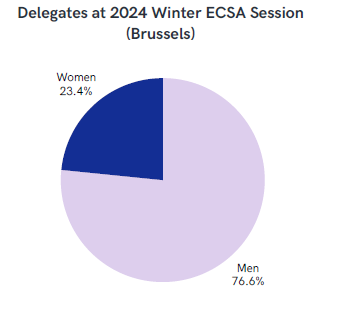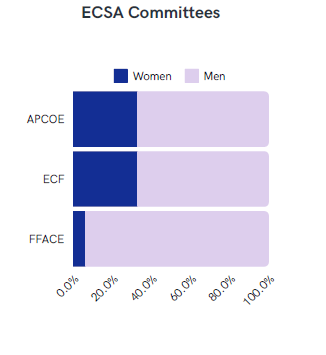The under-representation of women in the music industry in Europe, particularly in positions of responsibility and influence, is confirmed by a new study conducted among members of the European Composer and Songwriters Alliance (ECSA). The results complement the picture painted by a number of other studies considered by the network as part of the Diversity and Inclusion Working Group, which was launched in 2022 and has just been completed.
As a result of this process, ECSA has adopted seven recommendations to improve gender equality, based on the findings and lessons learnt during this period. Supported by the Creative Europe Agreement, the Working Group held discussions to raise awareness on several diversity and inclusion issues, including gender stereotypes, the gender pay gap, sexual harassment, power relations and the lack of women in positions of influence and decision-making.
Data collected by ECSA on the composition of its members' boards, committees, delegates to ECSA meetings and the presence of women in senior positions within member organisations provides an overview of the gender balance within it's network.

According to the report, only 31% of the people serving on executive committees within the ECSA network were women. Only 14% of these had a woman in the role of President or Chair of the Board. On the current ECSA Board, 33% are women. Among ECSA's three committees, the percentage of women is as follows 33% in APCOE, 33% in ECF and 5.9% in FFACE. Finally, at the ECSA General Assembly in Brussels, only 23.4% of the delegates sent by ECSA member organisations were women.

As the authors of the report mention, the particularly low representation on the FFACE committee is in line with data from the European Audiovisual Observatory, which shows that only 11% of all composers of European TV films and series were women in 2022. This figure varied widely across Europe, with female composers accounting for 13% of commissions in the UK and 0% in Italy and Hungary.

According to "Le lab femmes de Cinema", the number of audiovisual titles with female composer teams was also only 9%. In addition, between 2015 and 2022, female composers composed on average fewer episodes than their male counterparts.
In classical and contemporary music, women are still severely under-represented as conductors and composers. Despite accounting for 7 of the top 20 most performed living composers in 2023, only 36 of the top 100 most performed living composers were women, as highlighted in 'Bachtrack's 2023 Classical Music Statistics'. Similarly, an internal ECSA report found that only 26% of the pieces submitted for ECCO concerts between 2015 and 2020 were composed by women.
According to the 'Be the change' report on gender equality in the music industry, published earlier this year, 60% of female respondents in Europe found the music industry to be 'generally discriminatory', compared to only 16% of men. Women are also twice as likely as men to say they are paid less than colleagues in the same or similar roles (34% compared to 17% of men). The same report also highlighted that 3 in 5 women in the music industry have experienced sexual harassment, with 1 in 5 having experienced sexual assault, and that 70% of them did not report these experiences due to fear of retaliation or the belief that nothing would change.
The 2022 report by the European Expert Network on Culture and Audiovisual on gender gaps in the cultural and creative sectors points out that women make up less than 20% of registered composers and songwriters. In popular and commercial music, despite the fact that female superstars outnumber their male counterparts, in 2022 women represented only 30% of artists on the US Billboard Hot 100 chart and, even worse, only 14% of songwriters, according to the report 'Inclusion in the Recording Studio'.
Seven guidelines for diversity and inclusion
Drawing on initiatives and best practices from within and outside ECSA's membership, the report makes the following recommendations for improving gender equality:
1. Setting goals, guidelines or commitments for gender equality
2. Adopting gender-inclusive language across all communications
3. Raising awareness about gender equality by sharing or collecting relevant information
4. Combating gender stereotypes
5. Adopting measures to prevent sexual harassment and discrimination
6. Promoting equal access to opportunities, leadership positions, and fostering female role models
7. Adopting an intersectional approach to gender equality
--
Photo: Joana Mallwitz, Konzerthausorchester Berlin
Credit: Simon Pauly
Photo source: https://www.konzerthaus.de/de/foto/konzertfotos/216











